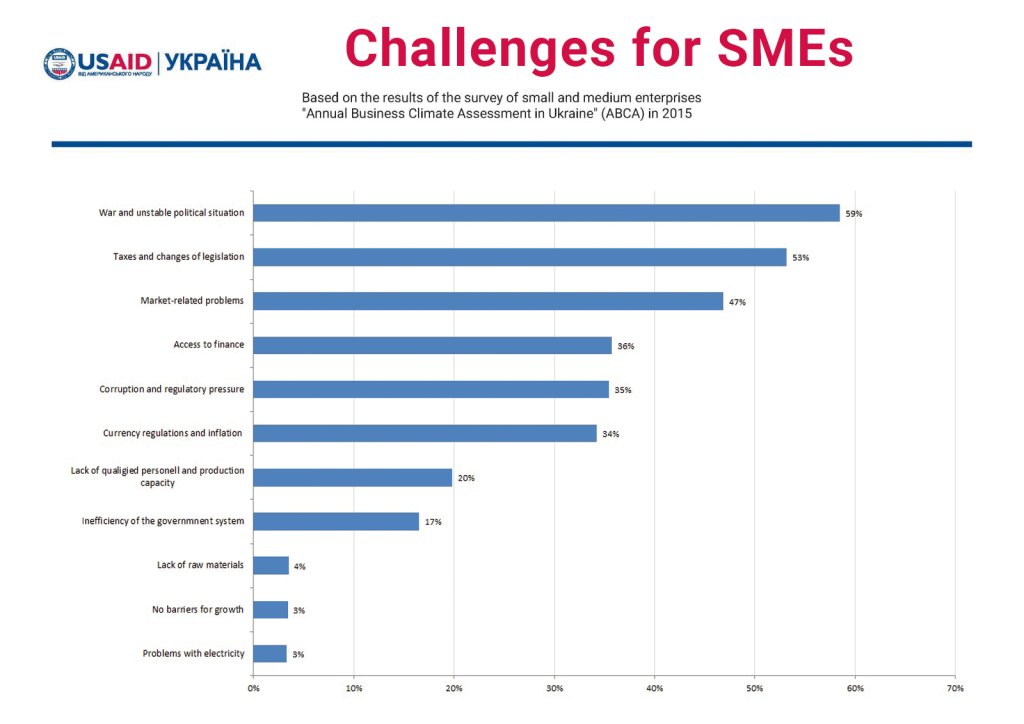In October, the USAID Leadership in Economic Governance (LEV) Program held its final event. The project lasted for three years and made an important contribution to the policy of small and medium enterprises (SMEs) development in Ukraine.
A flagship project of the program is the Annual Business Climate Assessment (ABCA), a national survey of entrepreneurs conducted twice by the Institute for Economic Research and Policy Consulting. The survey shows how Ukrainian entrepreneurs assess the business climate, what are their plans for the coming years, what situation is with employment, markets, exports, etc. Additionally, the ABCA contains a number of ratings: a rating of barriers and expectations for business development, a regulatory environment rating, a rating of trust in regional government, etc.
In terms of assessment of the national policy effectiveness, the ABCA survey has a number of advantages over Doing Business index. Now we have an actually unique instrument for Ukraine, whose potential is used far from fully, which is what shall be now discussed in detail.
1. General political dimension. Conducted on an annual basis, the ABCA survey allows to adequately assess not only perceptions of state policy measures by small and medium businesses, but also sentiments of SMEs, their attitude towards the state and expectations in various dimensions – in particular in the regional perspective.
On a separate note, the annual assessment data can help draw a quality picture of SMEs in Ukraine. The respective policy should begin by thoroughly determining the target audience. Furthermore, the dynamics of the money the businesses spend to comply with regulatory rules and procedures are one of the key issues of the regulatory climate reform in the country.
The regulatory assessment of the business climate must become a “normal” component of the SMEs development policy. This is because without such kind of research policymakers simply lack an adequate understanding of what is happening with the subject of regulation and how it responds to the respective policy measures.
2. Regional dimension. In practice, regional and local governments are bound to respond to the challenges faced by businesses in their region. The decentralization process provides them with new opportunities in terms of facilitation of SMEs development.
The ABCA instrument can help regional and local governments to see what barriers exist in their region. Afterwards, within their powers, they will be able to eliminate local barriers hindering the development of SMEs. The local government, with its activities, should actively influence the development of an agenda of the economic policy on the nationwide level.
3. Entrepreneurship dimension. To develop and effectively implement an adequate policy for promoting the development of SMEs, the government must conduct a constant, structured, and responsible dialogue with the business community. In this context, the latter often lacks the skill of clearly determining the nature and content of common business requests and priorities in their solution. This problem has a reverse side – low capacity of business associations to protect effectively the interests of their members, which, in turn, hinders the development of such associations.
The annual survey of SMEs allows entrepreneurs to clearly formulate a specific representative “request” for the respective policy, monitor the effectiveness of the policy influence and define the list of priority areas of interaction between the government and the private sector.
4. Donor dimension. A great many international technical assistance projects are currently in place in Ukraine aiming to improve the business climate, offer the specific support to industries and individual enterprises. In such conditions, the importance of the regulatory assessment of the business climate by beneficiary enterprises cannot be overstated. In the framework of certain projects, attempts are being made to create own instruments for assessing the business climate and behaviour (e.g., readiness to invest or expand the production) of primary economic agents.
The annual business climate assessment in Ukraine enables donors to evaluate the effectiveness of the government policy relating to the creation of the normal regulatory regime, to adequately plan its activities within the framework of the technical assistance projects and assess the effectiveness of the technical assistance projects in terms of entrepreneurship development.
5. Analytical dimension. The annual business climate assessment is a huge bulk of largely unique qualitative information. Its volumes will increase year on year. Various researches can be conducted based on these data, which will contribute to developing the national pool of business climate assessment experts (working with businesses, representatives of higher educational institutions, governmental and non-governmental research institutions, etc.). The assessment results in the Open Data format will contribute to expanding and deepening the theoretical and applied research into the business climate.
Conclusions
So what can be done to ensure that the insights of the foreign technical assistance projects become a standard component of the economic policy development and implementation? An ability to use relevant instruments is the best evidence of the institutional maturity of the Government in the broad sense.
Business associations have to be the initiators and customers of regular researches of business community’s common challenges of the regulatory climate, quality business processes, prevailing sentiment of entrepreneurs, etc. It is clear that business associations that do not realize the “know yourself” function and do not engage in a serious analysis of the business climate cannot as such conduct an equal dialogue with the government. Thus, they will specifically not have any arguments for protecting the interests of businesses and their members either.
Various international instruments for assessment of business processes, such as Doing Business, are too idealized. In many cases, measuring the progress of reforms requires national assessment instruments, which would adequately reflect our socioeconomic and political background. We are not talking about trying to come up with the Ukrainian version of the Pythagorean Theorem. Modern methods of applying the quantitative and qualitative assessment methods have long since been mastered. Now is the time to use them for our needs.



